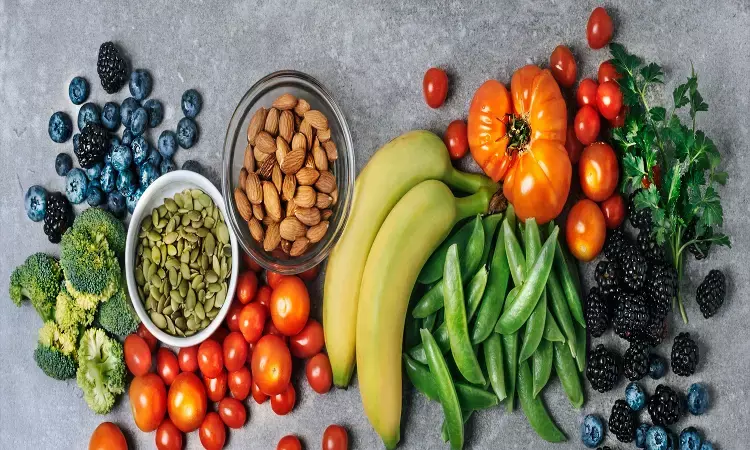- Home
- Medical news & Guidelines
- Anesthesiology
- Cardiology and CTVS
- Critical Care
- Dentistry
- Dermatology
- Diabetes and Endocrinology
- ENT
- Gastroenterology
- Medicine
- Nephrology
- Neurology
- Obstretics-Gynaecology
- Oncology
- Ophthalmology
- Orthopaedics
- Pediatrics-Neonatology
- Psychiatry
- Pulmonology
- Radiology
- Surgery
- Urology
- Laboratory Medicine
- Diet
- Nursing
- Paramedical
- Physiotherapy
- Health news
- Fact Check
- Bone Health Fact Check
- Brain Health Fact Check
- Cancer Related Fact Check
- Child Care Fact Check
- Dental and oral health fact check
- Diabetes and metabolic health fact check
- Diet and Nutrition Fact Check
- Eye and ENT Care Fact Check
- Fitness fact check
- Gut health fact check
- Heart health fact check
- Kidney health fact check
- Medical education fact check
- Men's health fact check
- Respiratory fact check
- Skin and hair care fact check
- Vaccine and Immunization fact check
- Women's health fact check
- AYUSH
- State News
- Andaman and Nicobar Islands
- Andhra Pradesh
- Arunachal Pradesh
- Assam
- Bihar
- Chandigarh
- Chattisgarh
- Dadra and Nagar Haveli
- Daman and Diu
- Delhi
- Goa
- Gujarat
- Haryana
- Himachal Pradesh
- Jammu & Kashmir
- Jharkhand
- Karnataka
- Kerala
- Ladakh
- Lakshadweep
- Madhya Pradesh
- Maharashtra
- Manipur
- Meghalaya
- Mizoram
- Nagaland
- Odisha
- Puducherry
- Punjab
- Rajasthan
- Sikkim
- Tamil Nadu
- Telangana
- Tripura
- Uttar Pradesh
- Uttrakhand
- West Bengal
- Medical Education
- Industry
Modified DASH Diet Lowers Blood Pressure via Sodium Reduction: DASH4D Trial

Researchers have found in a crossover feeding study (DASH4D trial) in patients with type 2 diabetes and hypertension that a low-sodium DASH4D diet modestly reduced systolic blood pressure by 4.6 mm Hg compared to a typical U.S. diet. The primary benefit was linked to sodium reduction rather than the diet pattern alone. The study was published in JAMA Internal Medicine by Scott J. and colleagues.
Adults with type 2 diabetes and hypertension have an increased risk for cardiovascular events because of chronic blood pressure elevation. Although lifestyle changes and pharmacologic therapy are the cornerstone of management, little evidence exists from feeding studies determining the effect of dietary changes alone, independent of weight loss, on blood pressure in these patients. The original DASH diet showed blood pressure benefit in the general population, but its effects had not been formally optimized or tested for individuals with type 2 diabetes—who tend to need individualized macronutrient needs and who are frequently on multiple medications.
The DASH4D trial was intended to bridge this gap by comparing a version of the DASH diet tailored for patients with type 2 diabetes lower in carbs, higher in monounsaturated fats, and containing less potassium with controlled sodium intake.
The DASH4D trial was a 4-period randomized crossover feeding trial at a community-based center from June 2021 through June 2024, with final data analysis in November 2024. The research recruited 102 type 2 diabetes adults, systolic blood pressure of 120–159 mm Hg, and diastolic blood pressure below 100 mm Hg. The subjects were supplied with all their meals, asked not to eat any food outside the research, and their weight kept constant during the research.Every subject was put on four different diets in a random sequence, each for five weeks: DASH4D diet low sodium, DASH4D diet high sodium, Comparison (typical US) diet with reduced sodium, Reference diet with increased sodium (used as comparison).
The main outcome was end-of-period systolic blood pressure, with secondary outcome diastolic blood pressure.
Key Findings
• 85 of the 102 enrolled participants (83.3%) completed all four diet phases.
• Participants' average age was 66 years, with 66% being women.
• Racial composition: 87% Black, 6% White, 6% Asian, 2% Hispanic.
• 66% of participants were on two or more antihypertensive medications.
• Baseline mean blood pressure was 135/75 mm Hg.
• The DASH4D low-sodium diet lowered systolic BP by 4.6 mm Hg (95% CI, 7.2 to 2.0; P < .001) in comparison with the US diet with high sodium.
• Diastolic BP decreased by 2.3 mm Hg (95% CI, 3.7 to 0.9) using the DASH4D low-sodium diet.
• The majority of the decreases in blood pressure took place during the initial 3 weeks of every dietary period.
• Sodium reduction was more potent on blood pressure compared to the DASH4D diet alone.
• Adverse events were uncommon during all periods of diet.
This trial establishes that sodium reduction with a DASH4D diet produces clinically significant blood pressure reductions in adults with type 2 diabetes, most of whom were receiving multiple antihypertensive medications. These results highlight the significance of dietary sodium restriction and endorse expanded use of formal dietary intervention as part of multidisciplinary hypertension treatment within diabetes care.
Reference:
Pilla SJ, Yeh H, Mitchell CM, et al. Dietary Patterns, Sodium Reduction, and Blood Pressure in Type 2 Diabetes: The DASH4D Randomized Clinical Trial. JAMA Intern Med. Published online June 09, 2025. doi:10.1001/jamainternmed.2025.1580
Dr Riya Dave has completed dentistry from Gujarat University in 2022. She is a dentist and accomplished medical and scientific writer known for her commitment to bridging the gap between clinical expertise and accessible healthcare information. She has been actively involved in writing blogs related to health and wellness.
Dr Kamal Kant Kohli-MBBS, DTCD- a chest specialist with more than 30 years of practice and a flair for writing clinical articles, Dr Kamal Kant Kohli joined Medical Dialogues as a Chief Editor of Medical News. Besides writing articles, as an editor, he proofreads and verifies all the medical content published on Medical Dialogues including those coming from journals, studies,medical conferences,guidelines etc. Email: drkohli@medicaldialogues.in. Contact no. 011-43720751


